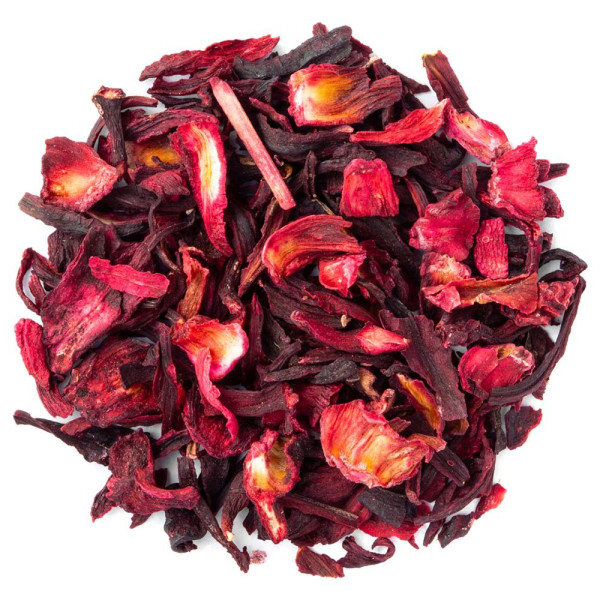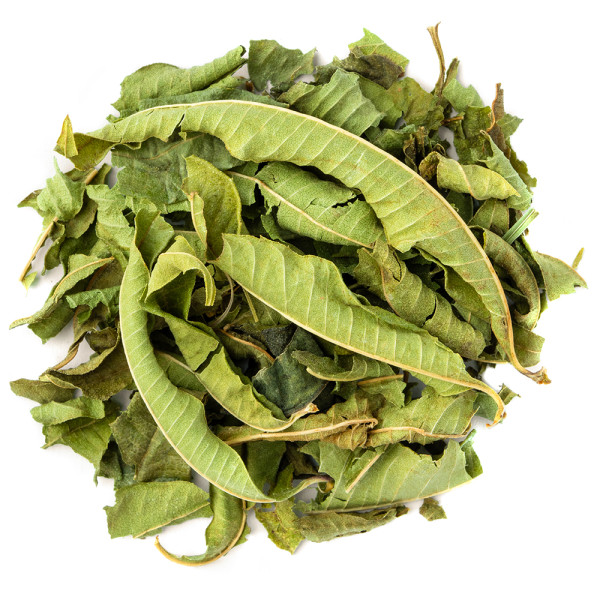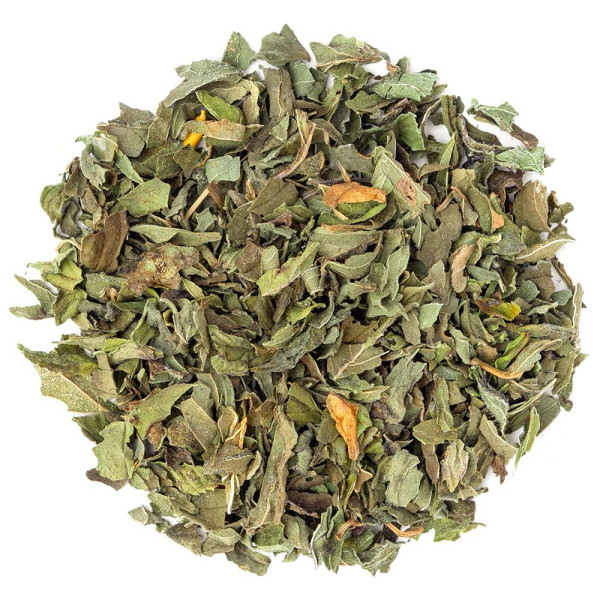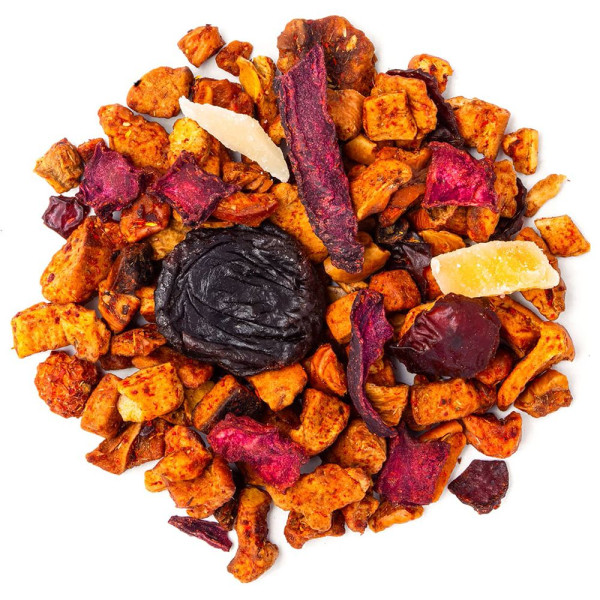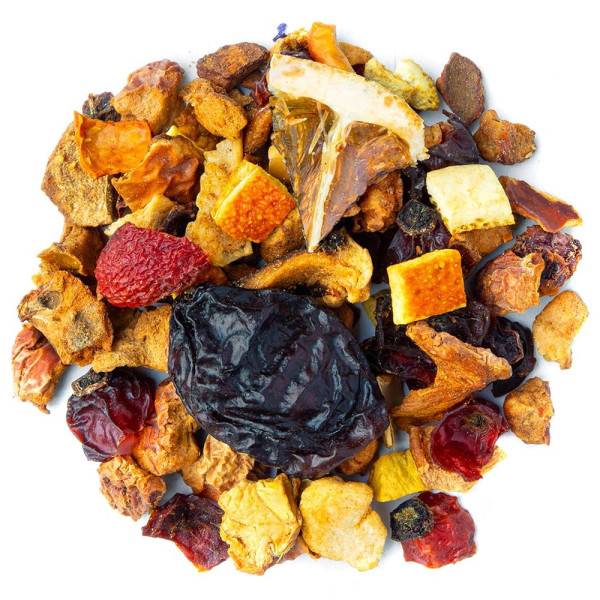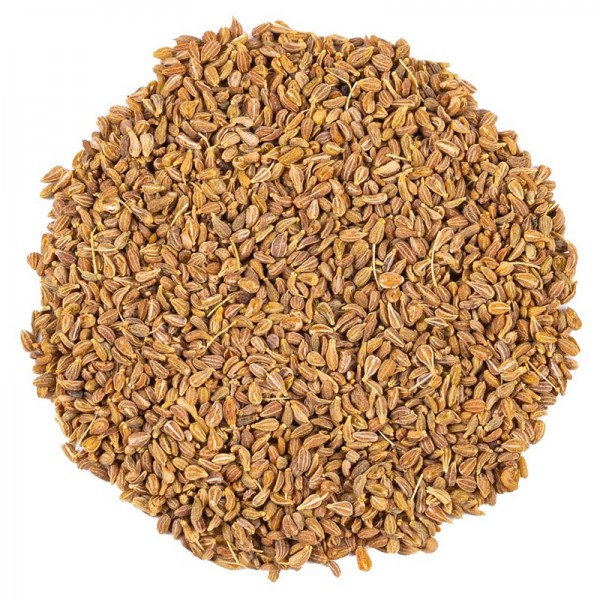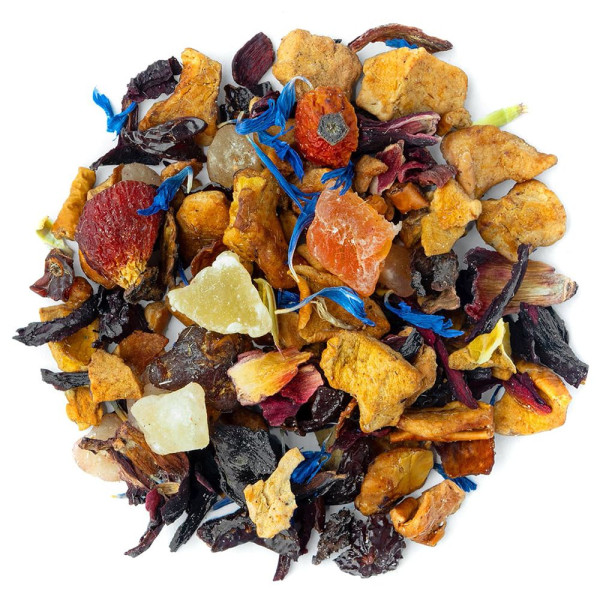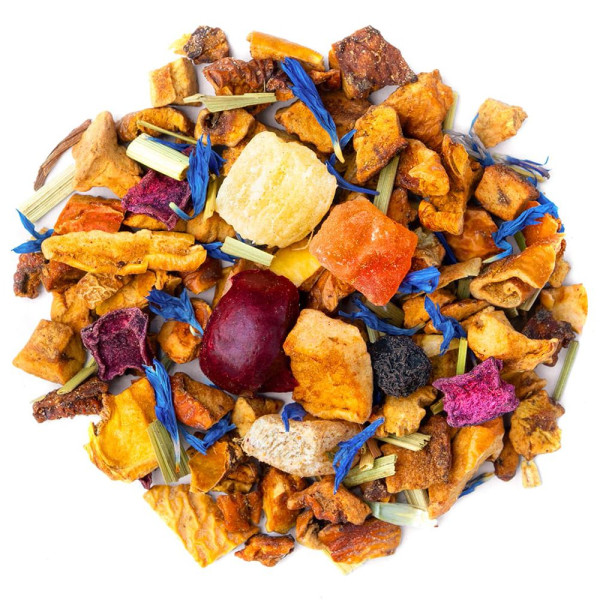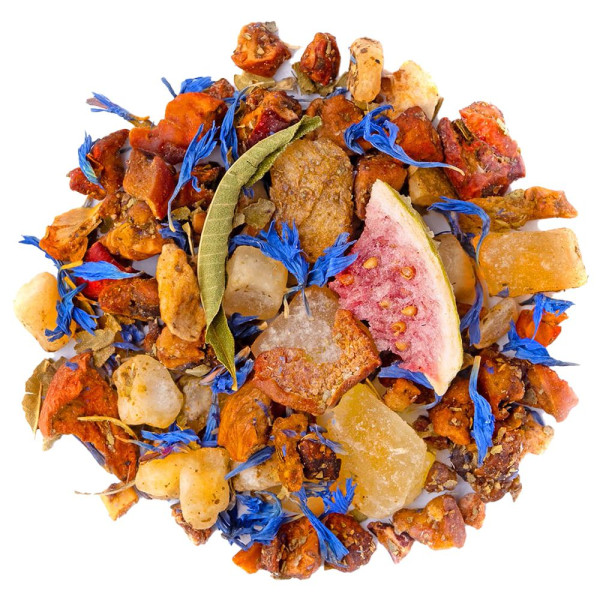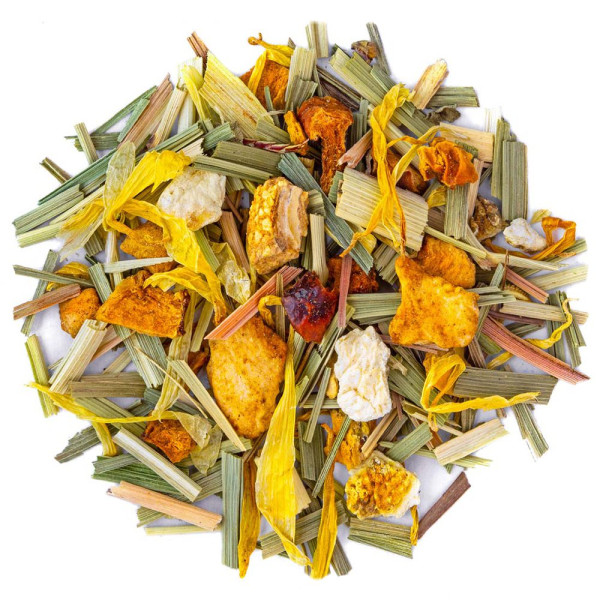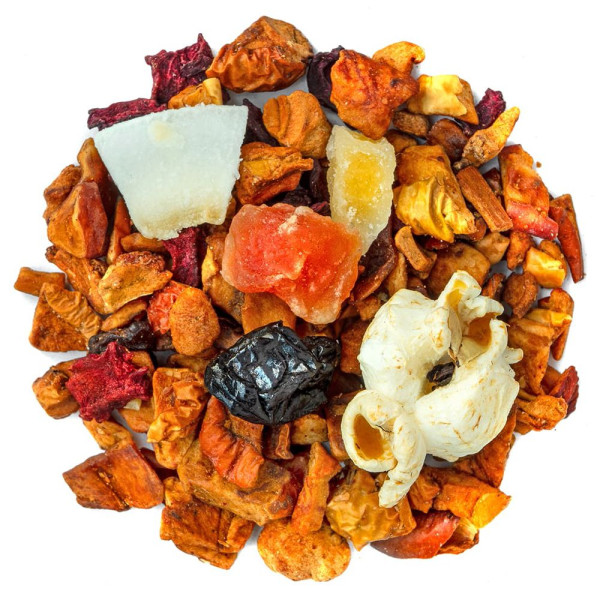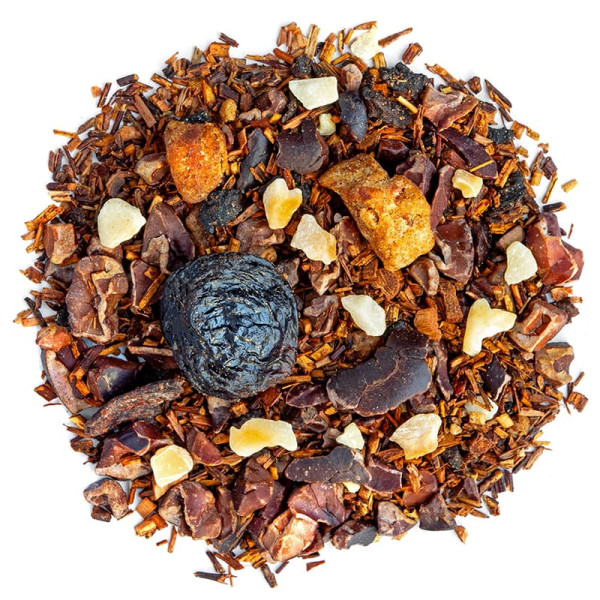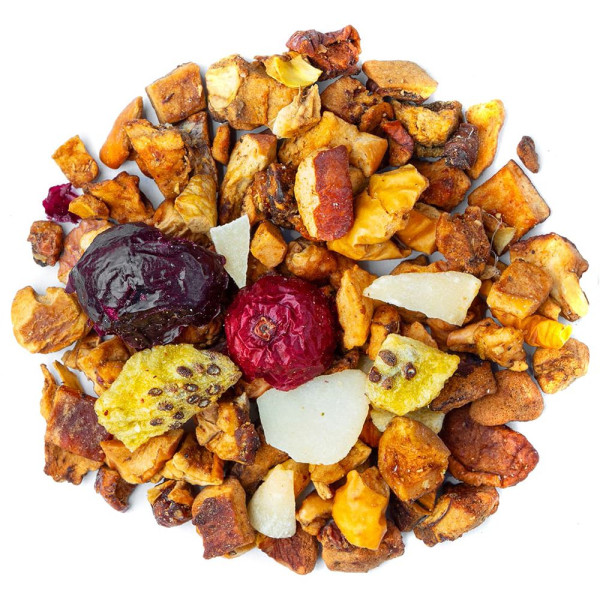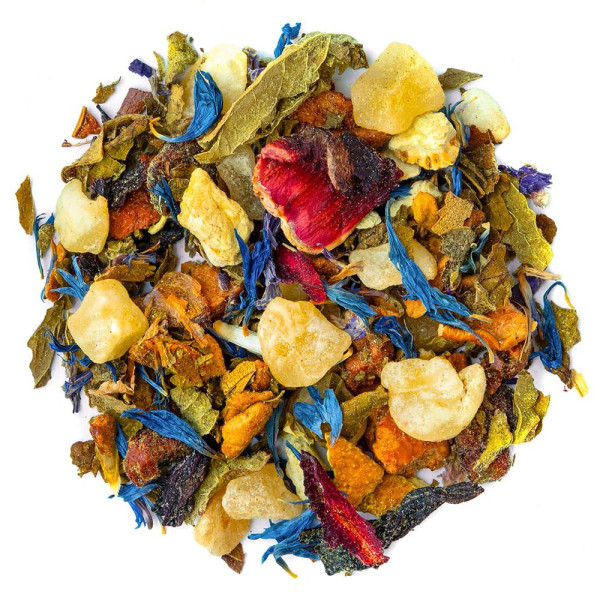Herbal teas and infusions
Embark on a world of flavors and benefits with herbal tea, this age-old beverage that never ceases to surprise us. From peppermint leaves to rose petals, through soothing chamomile and invigorating thyme, each cup is an invitation to relaxation and discovery. Much more than a simple infusion, herbal tea is a true elixir of well-being, combining the medicinal virtues of plants with gourmet and fruity notes. Whether you're a fan of exotic flavors like mango and pineapple, or a lover of classics like verbena and linden, let yourself be guided on this sensory journey where each sip brings you closer to a perfect balance between health and pleasure. Prepare to rediscover this ancestral drink in a new light, where tradition and innovation blend to create mixtures as surprising as they are delicious.
Dried hibiscus flowers. Fruity and tangy taste
Discover our detox teas & herbal teas
Herbal infusions with draining plants, ideal for your seasonal wellness programs.
Discover100% pure and organic whole verbena leaves with intense aroma
Organic peppermint herbal tea made of 100% mint leaves
Delicious fruity infusion with a pleasant cherry taste
Let yourself be seduced by this delicious and irresistible...
The ideal drink to relax after a long day at work!
An explosion of fruity flavors that will awaken your taste buds
A refreshing infusion with detoxifying properties
Delicious fruity and gourmet infusion with roasted almond notes
A delicious creation with chocolate spread flavor, a pure wonder
A universe of sweetness and delicacy with cherry, kiwi, and...
A refreshing note evoking the freshness of a summer breeze
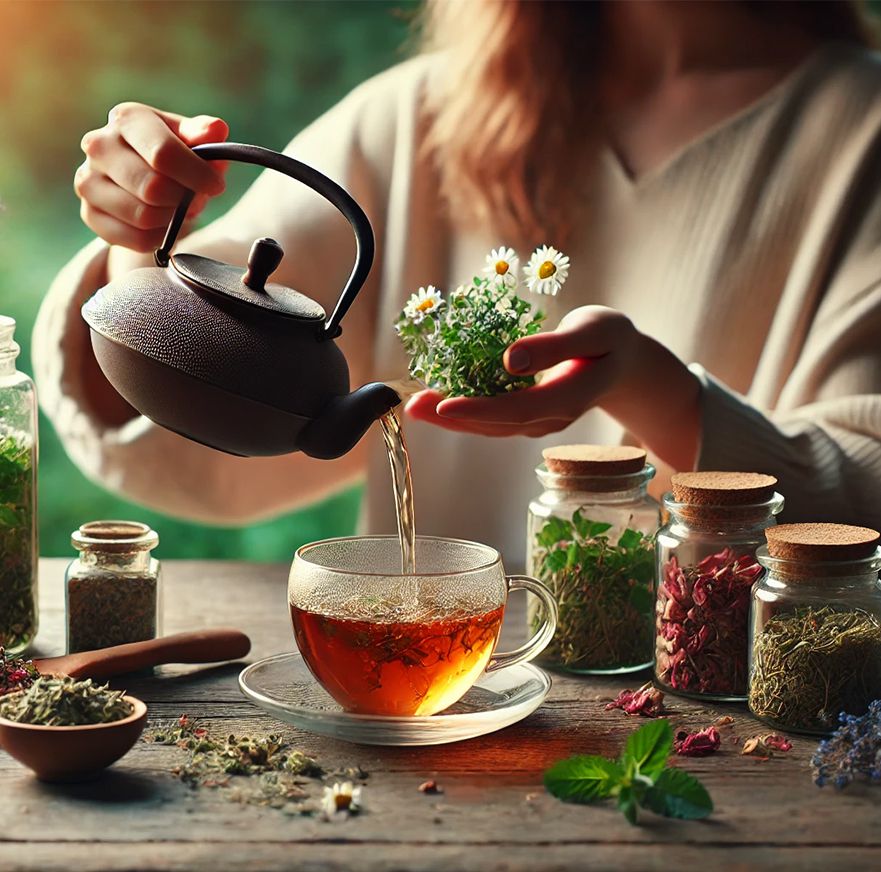
Herbal Teas: Benefits, Preparation, and Tips
What is a Herbal Tea?
A herbal tea is a beverage obtained by infusing parts of plants (leaves, flowers, roots, barks) in hot water. Unlike tea, it does not contain leaves of Camellia sinensis. Herbal teas can be composed of a single plant, such as chamomile or mint, or a complex blend. Each ingredient is carefully selected for its medicinal properties or aromatic profile, thus creating drinks with various virtues: relaxing, digestive, detoxifying, or energizing.
Differences between Herbal Tea, Tea, and Infusion
Although often used interchangeably, these terms refer to distinct preparations. A herbal tea is exclusively composed of plants, fruits, or spices, without tea leaves, and therefore contains no theine. Tea, on the other hand, is specifically prepared from the leaves of Camellia sinensis and naturally contains theine. Infusion is a generic term encompassing any beverage obtained by steeping plant matter in hot water, thus including both herbal teas and teas.
What is an Infusion?
Infusion is the process of extracting soluble compounds from a plant in hot water. This method allows the release of active ingredients, aromas, and flavors from the used plants. The water temperature and infusion time vary depending on the ingredients to optimize extraction without altering the benefits or taste. For example, delicate flowers require less hot water and a shorter infusion time than roots or barks.
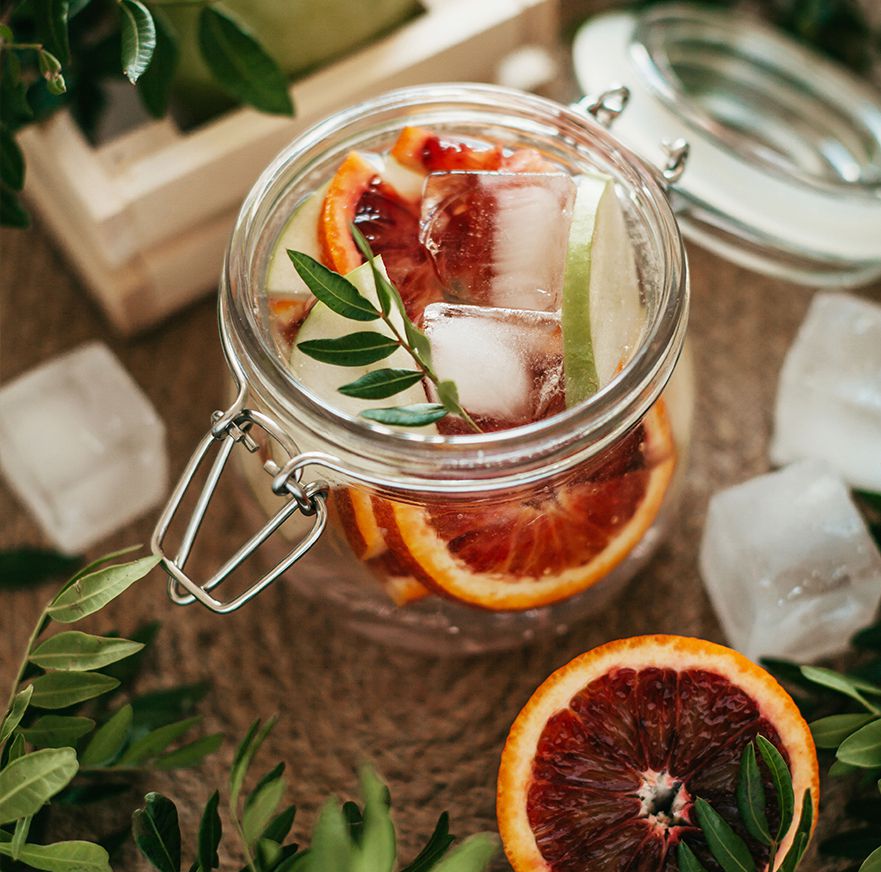
Herbal Teas as an Alternative to Tea or Coffee
Herbal teas offer an interesting alternative to tea and coffee, especially for those looking to reduce their caffeine intake. They have several advantages, including optimal hydration without a pronounced diuretic effect, the absence of caffeine (ideal for evening consumption), a variety of specific benefits depending on the plants used, and a wide range of flavors allowing for diverse enjoyment.
However, they do not provide the immediate stimulating effect of caffeine. For those seeking an energy boost, certain herbal teas like mate or ginseng can offer a gentle alternative, although less powerful than coffee or tea. For example, mate, originating from South America, contains mateine, a compound similar to caffeine but with milder and more lasting effects.
The Benefits of Herbal Teas
Herbal teas offer a multitude of health benefits, varying according to their composition. For relaxation and sleep, chamomile, valerian, and linden are known for their soothing properties. In terms of digestion, peppermint, fennel, and star anise support digestive function, relieving bloating and intestinal discomfort.
For detoxification, dandelion, rosemary, and green tea stimulate liver and kidney functions, aiding in the elimination of toxins. Immune system strengthening can be supported by echinacea, elderberry, and thyme. Finally, goji berries, pomegranate, and rooibos are rich in antioxidants, fighting against oxidative stress.
How to Prepare a Perfect Herbal Tea
To extract the best from your herbs and create a flavorful herbal tea, follow these steps:
- Water: Use fresh water, filtered if possible, to preserve the purity of the aromas.
- Temperature: Adjust water temperature according to the herbs: 90-95°C (194-203°F) for roots and barks, 80-85°C (176-185°F) for leaves, 70-75°C (158-167°F) for delicate flowers.
- Dosage: Generally use 2 to 3 grams of dried herbs (or a heaping teaspoon) per 250 ml cup.
- Infusion: Cover your cup or teapot during steeping to preserve volatile essential oils.
- Time: Respect the recommended steeping time for each herb to obtain the best balance between flavor and effectiveness.
After steeping, carefully strain your herbal tea before tasting. You can customize your drink by adding honey, lemon, or other natural ingredients according to your preferences.
Recommended Steeping Time
The optimal steeping time varies depending on the nature of the herbs used. For delicate flowers like chamomile or hibiscus, 5-7 minutes is sufficient, as longer steeping can release bitter tannins. Leaves (mint, verbena, green tea) require 7-10 minutes to fully extract beneficial compounds without too much bitterness. Roots and barks (ginger, cinnamon, licorice) need 10-15 minutes, or even longer, to release all their virtues. Dried fruits ideally steep for 8-12 minutes to develop their natural sweetness. For complex blends, follow the producer's recommendations, generally around 8-10 minutes.
When and How to Consume Herbal Teas?
Harmoniously integrate herbal teas into your daily routine:
- In the morning: Opt for energizing herbal teas (mate, ginger) or detoxifying ones (green tea, dandelion) for a gentle wake-up.
- After meals: Choose digestive infusions (mint, fennel) to aid digestion and prevent bloating.
- During the day: Stay hydrated with fruity herbal teas or herbal blends suited to your current needs (concentration, relaxation).
- In the evening: Favor relaxing blends (chamomile, linden, lavender) to promote restful sleep.
Before physical exertion, an invigorating herbal tea (ginseng, guarana) can naturally boost your energy. In case of illness, adapt your herbal teas to the symptoms, such as thyme for sore throats or elderberry to strengthen immunity.
For optimal effectiveness, drink your herbal teas regularly and vary the blends to benefit from a wide spectrum of benefits. Don't hesitate to experiment with different combinations to find those that suit you best, both in terms of taste and their effects on your well-being. Consuming herbal teas can thus become a pleasant and beneficial ritual, perfectly integrating into a healthy and balanced lifestyle.
Specific Herbal Teas for Various Ailments
Choosing the right herbal tea can help alleviate various ailments:
- Insomnia: Lemon balm, passionflower, lavender - These plants have mild sedative effects, promoting relaxation and sleep onset.
- Stress: Hawthorn, St. John's wort, rhodiola - Known for their adaptogenic properties, they help regulate the stress response.
- Difficult digestion: Ginger, turmeric, licorice - These plants stimulate the production of digestive juices and soothe intestinal mucous membranes.
For sore throats, thyme, eucalyptus, and sage are particularly effective due to their antibacterial and anti-inflammatory properties. In case of fatigue, ginseng, guarana, and eleuthero, which are adaptogenic plants, help fight tiredness and increase the body's resistance.
Energizing Herbal Teas for a Boost
For a natural energy boost, certain herbal teas stand out:
Mate, rich in nutrients and stimulating compounds like mateine, offers a sustained energy boost without the side effects of caffeine. Ginger, stimulating and warming, improves blood circulation and boosts metabolism. Guarana, naturally containing caffeine, provides a pronounced stimulation but should be consumed in moderation. Finally, ginseng, a powerful adaptogen, improves physical and mental endurance.
Selection of the Best Organic Herbal Teas
To choose a high-quality organic herbal tea, pay attention to several criteria. Look for the official Organic Agriculture label, guaranteeing the absence of pesticides and GMOs. Favor herbal teas with clearly indicated plant origins, ensuring better traceability. Opt for airtight sachets that preserve the plants' aromas and choose blends with 100% natural ingredients, without artificial flavors or additives. Plants grown at high altitudes or in their natural habitat are often richer in active compounds.


